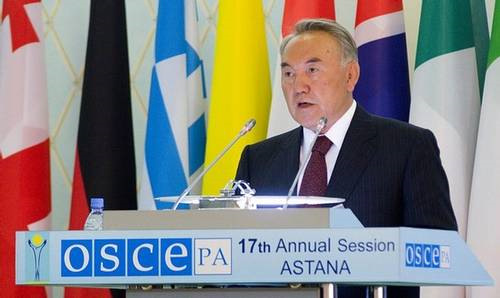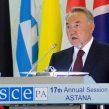
Kazakhstan Approaches OSCE Chairmanship as a “National Strategic Project”
Publication: Eurasia Daily Monitor Volume: 6 Issue: 162
By:

Kazakhstan’s President Nursultan Nazarbayev has instructed the government to form a State Commission on Preparations for Kazakhstan’s Chairmanship of the OSCE. Personally chairing an enlarged inter-departmental meeting on this subject, Nazarbayev described Kazakhstan’s chairmanship of the OSCE in 2010 as a "national strategic project." The State Commission should coordinate all aspects of the country’s effort, from policy analysis and diplomatic activity to personnel training and public outreach (Kazinform, August 8; Interfax, August 10).
It is an absolute premiere for a country with Kazakhstan’s set of characteristics -post-Soviet, Asian, predominantly Muslim, member of a Russia-led military alliance, and with a system of government described as super-presidential- to chair a pan-European organization, which in the OSCE’s case is essentially a European-North American organization. Yet, Kazakhstan holds a number of significant comparative advantages, as it embarks on this national strategic project (EDM, June 18).
Although generally overlooked by observers, those advantages can turn Kazakhstan’s chairmanship into a relative success, compared with the record of OSCE chairmanships in the last eight years. The inter-departmental meeting in Astana identified some of the Kazakhstani chairmanship’s priority issues within the OSCE’s three main themes. The listed priorities include: reduction of mass-destruction weapons, solutions to ecological problems, promotion of energy security goals, and the institutionalization of inter-ethnic and inter-confessional accord in societies.
Kazakhstan has a long record of involvement with those issues as a country that accepted voluntary de-nuclearization, grappled with Soviet-legacy ecological disasters, and created consultative institutions to defuse the potential for conflicts in its own multi-ethnic and multi-confessional society (Center for Strategic and International Studies and the Institute for New Democracies: CSIS-IND Task Force, "Supporting Kazakhstan’s OSCE Chairmanship Agenda," Policy Briefs I and II, Washington, July 2009).
While drawing on its past experience for its upcoming OSCE chairmanship, however, Kazakhstan will have to respond to new challenges, some of them unfamiliar or necessitating solutions that Russia opposes. This would be a new national experience that Kazakhstan can only approach cautiously.
Among the key issues, the protracted conflicts stand out. The OSCE has officially handled the negotiations on the Transnistria conflict since 1993, with no results thus far. Moreover, Moscow and Tiraspol have reduced the OSCE Mission in Moldova to irrelevance in terms of conflict-settlement in recent years; while the United States has yielded the leadership to the European Union on the Western side in the negotiating process. The E.U. is prepared for a serious effort to re-start the international 5+2 negotiations before the end of 2009. Kazakhstan’s chairmanship will undoubtedly be asked to assist in that effort.
In Georgia, the OSCE’s presence has been eliminated entirely since Russia used its veto power to terminate the Border Monitoring Operation in 2005 and the Mission to Georgia (with its small field presence in Tskhinvali) in 2008-2009. At present, the OSCE’s Greek Chairmanship proposes to open a small office in Tbilisi. The office would provide logistical assistance to the Chairmanship’s Special Representative, who participates in the Geneva talks on security and stability and visits Georgia regularly for meetings of the incident prevention and incident response mechanisms (OSCE press release, August 6; Georgian MFA press release, August 12). The Kazakh chairmanship would presumably appoint its own special representative to the Geneva talks and also inherit the Tbilisi office, if the latter opens before the end of 2009 as expected. This would in no way signify a re-opening of the OSCE Mission. Only the Permanent Council can authorize its re-opening, and it might be subject to a Russian veto. The proposed Tbilisi office can be handled by the OSCE’s Chairmanship at its discretion. Georgia welcomes this proposal, as well as any move to maintain an international presence in the country, after Russia’s eviction of OSCE and United Nations observers.
Meanwhile, the negotiating process on the Armenia-Azerbaijan conflict carries a purely nominal OSCE umbrella, but is actually being handled externally. Regarding Kosovo, the Kazakh chairmanship may have to handle a controversy over Kosovo’s possible admission to the OSCE as a participant country. Serbia has already announced that it would use its right of veto in that case.
In terms of the OSCE’s second priority (economics, ecology, energy supplies), demilitarization of the Caspian Sea is a goal that the Kazakh chairmanship has a unique opportunity to promote within the OSCE. This is a long-standing objective of Kazakhstan’s foreign policy, although it seems to have received less emphasis recently. Caspian demilitarization can be pursued more effectively as an energy supply security goal rather than an arms-control or a regional and military security goal. In the energy supply context, it can enlist many more interested parties and can move the debate from a narrow regional setting to a broader international framework.
Among additional issues, restoring the authority of OSCE’s Office of Democratic Institutions and Human Rights (ODIHR) poses special problems. ODIHR’s authority is being challenged from two opposite directions. On one front, Russia challenges the legitimacy of ODIHR’s methodology and structure, and has practically evicted ODIHR from Russia during its elections since 2007. On another front, self-defined democratic oppositions in Georgia and Moldova have petulantly rejected ODIHR’s election assessments in those countries in 2008 and 2009, respectively.
Kazakhstan is cooperating with Lithuania, the OSCE’s designated chair for 2011, in preparing for the chairmanship (press release, July 8). The two ministries of foreign affairs have signed a Lithuania-Kazakhstan Action Plan for cooperation between the two chairmanships. It includes a joint program to train diplomatic staff for the OSCE chairmanships, reciprocal secondment of diplomats between the two ministries, and a set of policy priorities to be pursued with joint efforts during both chairmanships. These priorities include advancing the settlement of protracted conflicts, and the facilitation of international overland transport by road and rail. It is hoped that continuity of agendas, long-term planning, and close cooperation between consecutive OSCE chairmanships can enhance the effectiveness of each, provided that national priorities are compatible.




